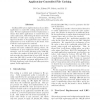Free Online Productivity Tools
i2Speak
i2Symbol
i2OCR
iTex2Img
iWeb2Print
iWeb2Shot
i2Type
iPdf2Split
iPdf2Merge
i2Bopomofo
i2Arabic
i2Style
i2Image
i2PDF
iLatex2Rtf
Sci2ools
117
click to vote
OSDI
1994
ACM
1994
ACM
Implementation and Performance of Application-Controlled File Caching
Traditional
le system implementations do not allow applications to control
le caching replacement decisions. We have implemented two-level replacement, a scheme that allows applications to control their own cache replacement, while letting the kernel control the allocation of cache space among processes. We designed an interface to let applications exert control on replacement via a set of directives to the kernel. This is eective and requires low overhead. We demonstrate that for applications that do not perform well under traditional caching policies, the combination of good application-chosen replacement strategies, and our kernel allocation policy LRU-SP, can reduce the number of block I/Os by up to 80%, and can reduce the elapsed time by up to 45%. We also show that LRU-SP is crucial to the performance improvement for multiple concurrent applications: LRUSP fairly distributes cache blocks and oers protection against foolish applications.
Applications Exert Control | Cache Replacement | Le Caching Replacement | Operating System | OSDI 1994 |
Related Content
| Added | 02 Nov 2010 |
| Updated | 02 Nov 2010 |
| Type | Conference |
| Year | 1994 |
| Where | OSDI |
| Authors | Pei Cao, Edward W. Felten, Kai Li |
Comments (0)

